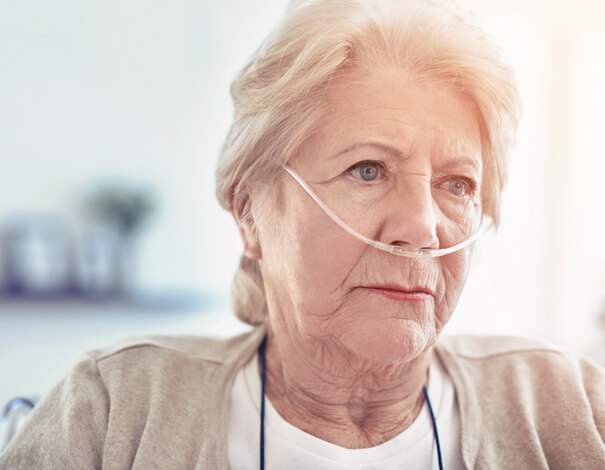COPD treatments & Help from your Pharmacist
Chronic obstructive pulmonary disease (COPD) is a term used to refer to two diseases: chronic bronchitis and emphysema.The ABCs of COPD
When you breathe, air enters through the nose or mouth and is directed to the lungs and to the small sacs known as alveoli. The oxygen you breathe in then exits the alveoli and goes on to supply the rest of the body. In the reverse direction, waste (primarily carbon dioxide) comes back into the alveoli and is flushed out when you exhale.
With chronic bronchitis, the lungs fill with mucus and the bronchial tubes become inflamed. This leads to difficulty breathing.
With emphysema, the problem is located in the alveoli. The walls of the alveoli become damaged, which impairs the exchange of oxygen and carbon dioxide. In addition, there is a tendency for air to remain trapped in the alveoli.
COPD causes a number of symptoms:
- Cough with phlegm
- Wheezing
- Shortness of breath
- Fatigue

Medication to treat COPD
To help you breathe easier, medication is prescribed to relax the airways, allowing them to open a little more and allow air to flow better. This medication is known as a bronchodilator. There are two main classes of bronchodilators. When a single bronchodilator does not provide sufficient relief of your symptoms, a second bronchodilator from the other class may be added, as each acts differently on the lungs.
In each class of bronchodilators, there are short-acting products that must be taken several times a day, and longer-lasting products that only need to be taken once or twice a day.
Short-acting bronchodilators are used to temporarily relieve certain persistent symptoms, while long-acting bronchodilators are prescribed for regular use.
If bronchodilators fail to eliminate the symptoms, other medications may be added, such as inhaled corticosteroids or, in some cases, antibiotics to treat a lung infection.
With COPD, it’s all about technique
The medications used to relieve COPD symptoms are delivered via devices that allow the medication to be inhaled so that it goes directly to the lungs.
It is crucial that such devices be used correctly to obtain the maximum effect of the medication. Your pharmacist will show you how to use the device and ensure your technique is right throughout your treatment. He or she will also monitor the efficacy of your treatment and contact your doctor if your treatment needs to be tweaked.
It is important to let your pharmacist know if you experience any problems with your medication. He or she will be able to propose a solution.
Your pharmacist is there for you
COPD is a progressive disease, meaning that the symptoms tend to worsen over time, even with proper use of medication. Some people with COPD mistakenly believe that nothing can be done to further relieve their symptoms. In fact, it is possible to make adjustments to your treatment to better address your needs. Don’t hesitate to talk about it with your pharmacist.
Smokers who suffer from COPD should quit smoking. It is always beneficial to quit smoking, and doing so is the only action that can effectively slow the progress of the disease.
If you are also taking medication for other health problems, it is possible that your prescription drugs aren’t all due for renewal at the same time. Your pharmacist can synchronize your prescription renewal dates so you only have to make one trip to the drugstore. Feel free to ask them to do so.
The pharmacy services presented in this section are offered by pharmacist owners who are affiliated with Proxim. The pharmacists are solely responsible for the professional activities carried out during the practice of pharmacy.
The information contained herein is provided for informational purposes only and is not intended to provide complete information on the subject matter or to replace the advice of a health professional. This information does not constitute medical consultation, diagnosis or opinion and should not be interpreted as such. Please consult your health care provider if you have any questions about your health, medications or treatment.




